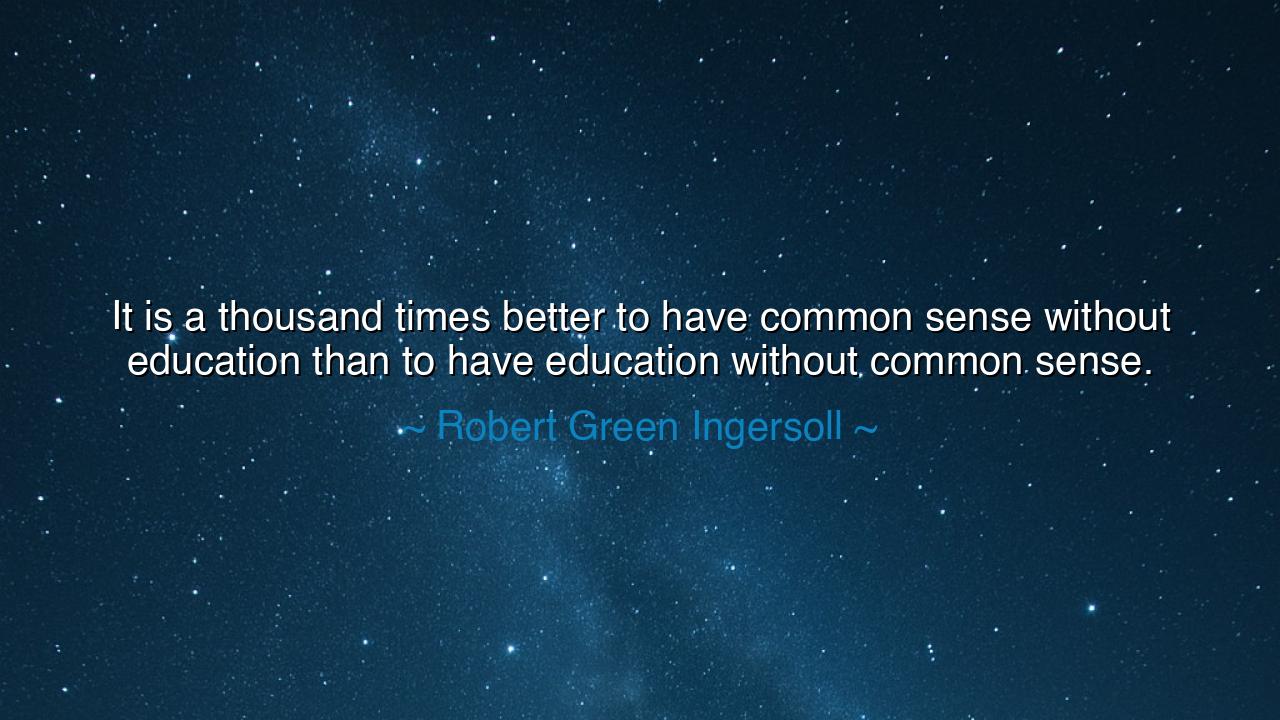
It is a thousand times better to have common sense without
It is a thousand times better to have common sense without education than to have education without common sense.






There are sayings that shine like beacons in the night, guiding those lost between intellect and wisdom. Among them, “It is a thousand times better to have common sense without education than to have education without common sense,” spoken by Robert Green Ingersoll, resounds with the clarity of timeless truth. Ingersoll, a 19th-century orator and humanist, spoke these words during an age when formal education was becoming the measure of a man’s worth. Yet he saw deeper—that knowledge without judgment is like a sword in the hands of a child. It dazzles, but it wounds. Common sense—that sacred intuition of life, born of experience and humility—anchors wisdom in reality, while mere education, untempered by it, may lead even the brightest astray.
To understand this teaching, one must recall that education is the filling of the mind, while common sense is the tempering of the soul. A man may study the stars and still stumble in the dark if he cannot light a lamp. The wise Ingersoll spoke not against learning, but against vanity—the pride that mistakes degrees for discernment. Common sense teaches what no book can: when to speak, when to act, when to pause. It is the silent compass that keeps one from folly when the intellect alone cannot. For knowledge shows what can be done, but common sense knows what should be done.
History bears witness to this truth. In the great saga of invention, there was Thomas Edison, who had little formal education but possessed boundless practical wisdom. He failed a thousand times before giving the world the light bulb, not through academic formulas, but through the tenacity and realism of common sense. Meanwhile, the learned men who mocked him for his simplicity are now forgotten, buried beneath their theories. So it is across all time: those with sound judgment and human understanding achieve what the overly learned cannot, for they act with both mind and heart aligned.
In contrast, we see the tragedy of educated foolishness written in the pages of history. There were scholars who defended slavery with reasoned arguments, doctors who justified cruelty in the name of science, and politicians who destroyed nations while quoting philosophy. These men were not ignorant; they were educated without wisdom, clever without conscience, and thus more dangerous than any unlettered peasant. Common sense, that divine spark of empathy and proportion, would have stayed their hands—but pride deafened them. For what is intellect without morality but a serpent without a master?
Let the young remember: education refines the mind, but common sense preserves the soul. One may master a thousand books and yet fail at living rightly. The humblest farmer who knows when to plant, how to share, and when to hold his tongue may possess more wisdom than the scholar who scorns him. For in the fields, common sense grows like the wheat—quietly, steadily, and with purpose. It feeds life itself, while hollow knowledge withers in the wind.
Therefore, do not despise learning, but learn with humility. Let your education be the servant of your reason, not its tyrant. Seek not to appear wise, but to live wisely. The greatest minds—Socrates, Confucius, Ingersoll himself—taught that wisdom begins with the admission of ignorance. In that space of humility, common sense blooms. It teaches one to observe before judging, to listen before speaking, and to act not from pride but from understanding.
The lesson is clear: common sense is the root of wisdom; education is but its branch. Cultivate both, and your life will stand firm against the storms of folly. But if you chase knowledge without grounding yourself in truth, you will become like a tree with no roots—brilliant in bloom, but doomed to fall. So, let every generation remember: it is not the scholar who is most learned, but the human who understands life as it is—plain, imperfect, and infinitely precious.
And in the quiet reflection of these words, let this action follow: when faced with choice, use not only what you know, but what you feel to be right. When tempted to act clever, choose instead to act wise. For in the end, common sense will lead you where education alone cannot—toward a life of balance, dignity, and peace.






AAdministratorAdministrator
Welcome, honored guests. Please leave a comment, we will respond soon